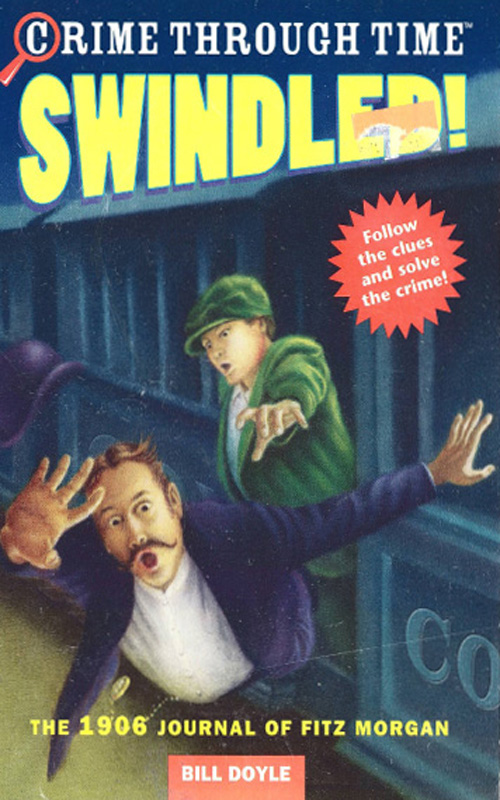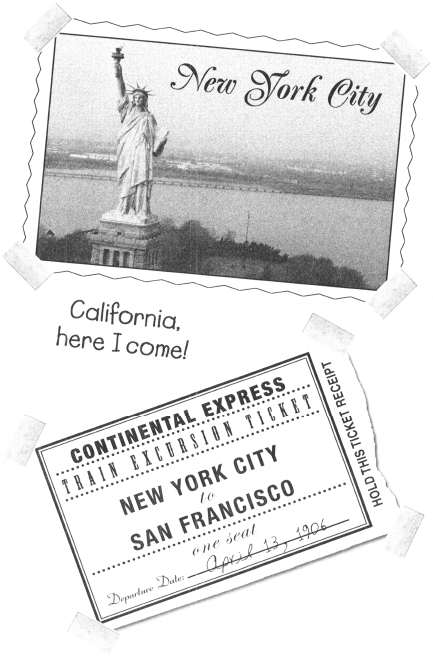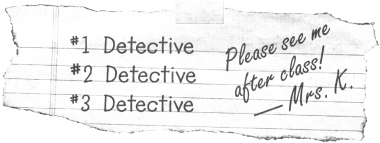Swindled!: The 1906 Journal of Fitz Morgan
Read Swindled!: The 1906 Journal of Fitz Morgan Online
Authors: Bill Doyle


This book is dedicated to Alex Podeszwa
for being such an amazing kid.
–B.D.
Text copyright © 2006 by Bill Doyle
Compilation, illustrations, and photographs copyright © 2006 by Nancy Hall, Inc.
Crime Through Time is a trademark of Nancy Hall, Inc.
Developed by Nancy Hall, Inc.
All rights reserved.
Little, Brown and Company
Hachette Book Group
237 Park Avenue
New York, NY 10017
Visit our website at
www.HachetteBookGroup.com
First eBook Edition: September 2009
ISBN: 978-0-316-08452-9
A thank-you of historic proportions to Nancy Hall for making this book and the Crime Through Time series a reality. To Kirsten Hall, for her keen editing and insightful grasp of the overall picture, and to Atif Toor making the whole nbook come alive visually.
Special thanks to the editors at Little. Brown:AndreaSpooner. Jennifer Hunt, and Phoebe Sorkin, who are always dead-on, always incisive,and never discouraging. And thanks to Riccardo salmona for his constant support.

Contents
WARNING: This letter reveals the story’s ending!
The adventure of a lifetime has begun!
The night landscape of the eastern United States is whizzing by outside my window I’m on board the Continental Express, a
train bound from New York City to San Francisco. We’re racing along the rails at thirty miles per hour, so this trip will
take only five days. Just a few years back, it would have meant six months on a horse-drawn stagecoach. I would have been
fifteen by the time we reached California!
Two hours ago Cousin Frederick dropped me off at New York City’s Pennsylvania Station. What a madhouse! Whistles shrieked
as trains clattered up to platforms. Shouting vendors wheeled their carts of fresh flowers and cured meats through the crowds
of travelers. Choking clouds of smoke poured from the enormous black locomotives and hovered over the crowds.
I loved it!

While people pushed by us at the entrance to the station, Cousin Frederick handed me a bag of cured-ham sandwiches and said,
“Fitz, you tell that Aunt Elizabeth of yours hullo for me.”
He gave my appearance one last disapproving look from under his bushy eyebrows. “You’re full of grit but don’t go waking snakes
on your vacation. Your father couldn’t bear it if something happened to you, too.”

Frederick was talking about my family’s bad luck. The flu had carried Mother away eleven years ago. And my brother, Killian,
died three years later, in 1898. After that, Father and I were left knocking around in our big townhouse alone, and Father
grew more and more protective of me. So much so that he waited until after my fourteenth birthday to let me visit Aunt Elizabeth
in San Francisco.
I promised Cousin Frederick that Teddy and I would steer clear of trouble. Frederick looked a little doubtful, but with a
quick wave he disappeared into the crowd, off to deliver blocks of ice from his horse-drawn cart.
Then I was alone with Teddy. Bundled up in a blue blanket, he squirmed in my arms. I cooed to him, “There, there, that’s a
good baby,” loud enough for others to hear. I slid through the crowd to the ticket window–and my first challenge of the day.
“Where to, son?” the silver-haired ticket seller asked gruffly. Mystery and adventure! I wanted to shout. But remembering
to keep my voice low, I answered, “San Francisco, please.”
The ticket seller yawned (how could he yawn upon hearing such an exciting destination!) and pointed a finger at the swaddled
bundle in my arms. “How old is the little one?”

“Just a pup,” I replied, looking the man in the eye. Always maintain eye contact when working a case! It inspires trust in
others.
“Infants ride free.” The ticket seller took my coins and slid my ticket through the window. He shouted, “Next!” to the person
behind me when I didn’t move along instantly.
Dizzy, I focused on the arrow pointing to my platform. I left the main terminal and plunged into the station’s maze of tunnels.
I didn’t want to get lost and miss my train–which, according to the big station clock, was scheduled to leave in just nine
minutes!

I shifted the bundle in my arms-which was getting heavy!–and out popped Teddy’s tail, wagging happily. I couldn’t help laughing.
The detective training mission for today-pretending to carry a baby-was complete. I unwrapped Teddy from the small blanket
and put him down.
A frazzled businessman hurrying by did a double take as the “baby” gave his furry body a good shake, scratched behind his
ears, and slobbered his tongue all over my outstretched hand.

I thought about telling the man, “Don’t worry, sir, this bulldog is part of my training!” But even if he had not rushed off
to catch a train, I doubted he would have understood. Not many people do.
Take my teacher Mrs. Kerrit. She definitely wouldn’t understand. Six years ago, when I was eight, Mrs. Kerrit asked our class
to list three things we wanted to be when we grew up. My friends put things like wife, king, or banker on their lists. I wrote:

Mrs. Kerrit sent a note to Father, calling him in for a conference. She said that it was unrealistic for me to think I could
ever be a detective like he is. Luckily, I’ve got a great father. He told her that it was possible. “Anything that’s not worth
fighting for isn’t worth doing,” he said.
Together we decided I might need to work harder than some other people, but I could sharpen my skills with a daily regimen
of detective training–my version of a one-person investigator academy.
